|
|
|
Sort Order |
|
|
|
Items / Page
|
|
|
|
|
|
|
| Srl | Item |
| 1 |
ID:
118376
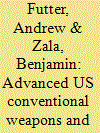

|
|
|
|
|
| Publication |
2013.
|
| Summary/Abstract |
The Obama administration has made a great effort to increase the role of advanced conventional weaponry in US national security thinking and practice, in part to help reinvigorate the global nuclear disarmament agenda by reducing the role played by nuclear weapons in the US defense posture. However, such a strategy is fundamentally flawed because increases in US conventional superiority will exacerbate US relative strength vis-à-vis other powers, and therefore make the prospect of a nuclear weapon-free world seem less attractive to Washington's current and potential nuclear rivals. Consequently, it is highly likely that the impact of efforts to increase US advanced conventional superiority through ballistic missile defense and a conventional "prompt global strike" program will ensure that the Obama administration is adopting a pathway to nuclear abolition on which it is the sole traveler for the foreseeable future.
|
|
|
|
|
|
|
|
|
|
|
|
|
|
|
|
| 2 |
ID:
146737
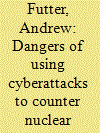

|
|
|
|
|
| Contents |
Top military and defense officials in the United States are currently contemplating plans to use cyberattack capabilities against enemy missile and command-and-control systems as part of a new push for full-spectrum missle defense.
|
|
|
|
|
|
|
|
|
|
|
|
|
|
|
|
| 3 |
ID:
183261
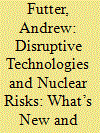

|
|
|
|
|
| Summary/Abstract |
Hype and fear have arisen about how certain technological developments are impacting the current nuclear order. New weapons systems and support facilities, potential vulnerabilities and associated destabilising dynamics could all place considerable strain on the global nuclear balance and accompanying architecture. This article examines five disruptive dynamics, explains their intricacies and nuances, and puts them in political and strategic context. The nature of nuclear risk is changing (in many cases for the worse), and there are a number of pressures which could have significant negative implications for escalation, stability and order if left unchecked. But these phenomena remain fundamentally political, and there are political mechanisms which can help reduce risks. Accordingly, while the risks posed by disruptive technologies to the nuclear order are real and growing, they should not be insurmountable.
|
|
|
|
|
|
|
|
|
|
|
|
|
|
|
|
| 4 |
ID:
111881


|
|
|
|
|
| Publication |
2012.
|
| Summary/Abstract |
Conventional wisdom seems to hold that under Barack Obama, the US ballistic missile defence programme has been pushed aside to allow for a refreshed domestic and international agenda. Proponents point to Obama's campaign thinking and rhetoric, the ballistic missile defence (BMD) budget cuts, the decision to end the Third Site in Europe, and the reset relations with Russia through the New Strategic Arms Reduction Treaty (New START) as evidence that the programme has undergone a significant period of change, retraction and rationalisation. This article argues instead that BMD has not fallen from prominence and that there is a change in focus rather than retraction of its strategic goal. Consequently, BMD continues to grow in importance as a component of US national security strategy.
|
|
|
|
|
|
|
|
|
|
|
|
|
|
|
|
| 5 |
ID:
106266
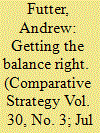

|
|
|
|
|
| Publication |
2011.
|
| Summary/Abstract |
Barack Obama has rightly embraced ballistic missile defense (BMD) as an important component of U.S. national security policy in an era where the requirements of nuclear deterrence are fluid and nuanced. Moreover, the deployment of these defenses may even provide several important benefits to the President's much-publicized nuclear nonproliferation and disarmament agenda. However, if the President's commitment to these goals is to remain credible and viable, then the importance of BMD against rogue states must be balanced with the need to avoid jeopardizing relations with key strategic competitors. As such, the President may have to limit U.S. BMD plans in the near future.
|
|
|
|
|
|
|
|
|
|
|
|
|
|
|
|
| 6 |
ID:
142165
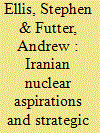

|
|
|
|
|
| Summary/Abstract |
With a few notable exceptions,1 it has become almost conventional wisdom to assume that a nuclear Iran is bad for its immediate neighbors, the wider Middle East region, and even the world.2 Such logic suggests that even an Iran with a nascent nuclear program would be emboldened in its meddling in Middle Eastern geopolitical affairs, present a serious, perhaps existential, threat to Israel and others, and could potentially lead to a nuclear-proliferation cascade among its immediate regional rivals. There is almost certainly some truth to these claims — and few people see an Iran armed with nuclear weapons as a good thing or something that should be welcomed. That said, much of the current debate has ignored or glossed over some of the other important geopolitical dynamics that have been driven by Iranian actions during the past decade: actions that have in fact been broadly positive for regional security and stability. As a result, if a comprehensive deal on the nuclear program cannot be reached by the June 30 deadline, the strategic implications of latent or even a nuclear-armed Iran may not be as catastrophic as some have suggested and more subtle than many fear.
|
|
|
|
|
|
|
|
|
|
|
|
|
|
|
|
| 7 |
ID:
108771
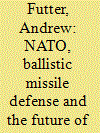

|
|
|
|
|
| Publication |
2011.
|
| Summary/Abstract |
Within the next few years, NATO will need to make a collective decision about the future of US tactical nuclear weapons (TNW) in Europe. While opinion about the value of these weapons is not as split as conventional wisdom might suggest, and while NATO will remain a nuclear alliance irrespective of this decision, balancing politics and strategy looks likely to be a difficult task. This decision is made far more complex by the determination of NATO officials to link the withdrawal of these weapons to reciprocal reductions in Russian TNW in Europe, and by the possibility of substituting the key strategic and political link they provide with a ballistic missile defense (BMD) system. This article shows how we have arrived at this position, highlights the potential benefits to NATO Europe of BMD, and considers the key questions that the Alliance will face in achieving this. Ultimately, this article shows how the future of TNW in Europe is likely to be linked to whether NATO values arms cuts with Russia, or the deployment of missile defenses, as its central priority.
|
|
|
|
|
|
|
|
|
|
|
|
|
|
|
|
| 8 |
ID:
178274
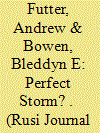

|
|
|
|
|
| Summary/Abstract |
The coronavirus crisis has exacerbated the challenges posed by Brexit, the Integrated Review and a separatist Scotland, and shined new light on the UK nuclear weapons debate. This combination of issues has bolstered the argument that the resources allocated to sustaining and replacing the ‘Trident system’ should be used to develop societal resilience and support the economy. The pandemic has also highlighted possible vulnerabilities of the Trident system and the opportunity costs for other parts of the military, and aggravated the uncertainties of a fluid domestic political and constitutional context within which decisions about the UK’s nuclear future will be made. But while this climate may lead the UK government and electorate to look again at the broader opportunity costs and geopolitics of remaining in the nuclear club, Andrew Futter and Bleddyn E Bowen argue that the most likely result will be business as usual, making it difficult to see when, if ever, the country will disarm in the foreseeable future.
|
|
|
|
|
|
|
|
|
|
|
|
|
|
|
|
| 9 |
ID:
146550


|
|
|
|
|
| Publication |
London, Sage Publications Ltd, 2015.
|
| Description |
xi, 263p.: tables, mappbk
|
| Standard Number |
9781446294314
|
|
|
|
|
|
|
|
|
|
|
|
Copies: C:1/I:0,R:0,Q:0
Circulation
| Accession# | Call# | Current Location | Status | Policy | Location |
| 058761 | 327.174/FUT 058761 | Main | On Shelf | General | |
|
|
|
|
| 10 |
ID:
150100
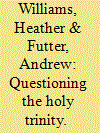

|
|
|
|
|
| Summary/Abstract |
Despite renewed enthusiasm for nuclear disarmament, a contemporary security environment far removed from that of the Cold War, and increasing budgetary pressures at home, U.S. interests continue to be best served by retaining a triad of nuclear forces. While options for a reduced force structure may appear to offer short-term political and economic expediency, in the long run a three-legged deterrent—possibly consisting of fewer delivery vehicles, operational warheads and even potentially de-alerted forces—represents the best way to balance the competing requirements of contemporary and future U.S. nuclear policy. Indeed, it may be that retaining the triad provides the most realistic method of reestablishing U.S.-Russia strategic stability, and the most credible basis for advancing the drive for global nuclear reductions, strengthening global nuclear security, and even working toward nuclear abolition.
|
|
|
|
|
|
|
|
|
|
|
|
|
|
|
|
| 11 |
ID:
096515
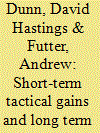

|
|
|
| 12 |
ID:
179368
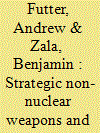

|
|
|
|
|
| Summary/Abstract |
Three decades after what is widely referred to as the transition from a First to a Second Nuclear Age, the world stands on the cusp of a possible Third Nuclear Age where the way that we conceptualise the central dynamics of the nuclear game will change again. This paradigm shift is being driven by the growth and spread of non-nuclear technologies with strategic applications and by a shift in thinking about the sources of nuclear threats and how they should be addressed, primarily, but not solely, in the United States. Recent scholarship has rightly identified a new set of challenges posed by the development of strategic non-nuclear weaponry (SNNW). But the full implications of this transformation in policy, technology and thinking for the global nuclear order as a whole have so far been underexplored. To remedy this, we look further ahead to the ways in which current trends, if taken to their logical conclusion, have the capacity to usher in a new nuclear era. We argue that in the years ahead, SNNW will increasingly shape the nuclear order, particularly in relation to questions of stability and risk. In the Third Nuclear Age, nuclear deployments, postures, balances, arms control, non-proliferation policy, and the prospects for disarmament, will all be shaped as much by developments in SNNW capabilities as by nuclear weapons. Consequently, we advocate for an urgent reassessment of the way nuclear order and nuclear risks are conceptualised as we confront the challenges of a Third Nuclear Age.
|
|
|
|
|
|
|
|
|
|
|
|
|
|
|
|
| 13 |
ID:
141679
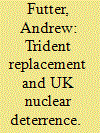

|
|
|
|
|
| Summary/Abstract |
A decision to replace Trident with a like-for-like system will see the UK remain in the nuclear-weapons business well into the second half of this century, but it is far from clear that reliance on a small, retaliatory nuclear capability for deterrence would be the best approach to an increasingly complex future nuclear-threat landscape. Andrew Futter argues that the requirements of deterrence are perhaps more blurred today than at any point in the nuclear age – a situation only likely to get worse. A more holistic and long-term view of UK nuclear policy is needed, with greater consideration given to how techno-military, strategic and, to a lesser extent, political-normative developments are likely to alter, if not transform, the nature of the future deterrence environment.
|
|
|
|
|
|
|
|
|
|
|
|
|
|
|
|
| 14 |
ID:
144765
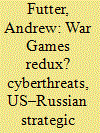

|
|
|
|
|
| Summary/Abstract |
Some 30 years since the release of the Hollywood blockbuster War Games, the possibility that hackers might break into nuclear command and control facilities, compromise early warning or firing systems, or even cause the launch of a nuclear weapon has become disturbingly real. While this challenge will impact all nuclear-armed states, it appears particularly acute for the USA and Russia given their large, diverse, and highly alerted nuclear forces. The fact that east–west relations have deteriorated to a nadir perhaps not seen since the 1980s, strategic instability has increased – particularly in the wake of the Ukraine and now Syria crises – and that the nuclear arms reductions agenda appears to have reached a standstill makes this challenge particularly pressing. In this discouraging milieu, new cyberthreats are both exacerbating the already strained US–Russia strategic balance – particularly the perceived safety and security of nuclear forces – and at the same time creating new vulnerabilities and problems that might be exploited by a third party. Taken together, these dynamics add another major complication for current arms control agreements and possible future nuclear cuts, and also seem likely to increase the possibility of accidents, miscalculation, and potential unauthorised nuclear use, especially given the large number of nuclear weapons that remain on “hair-trigger” alert.
|
|
|
|
|
|
|
|
|
|
|
|
|
|
|
|
|
|
|
|
|